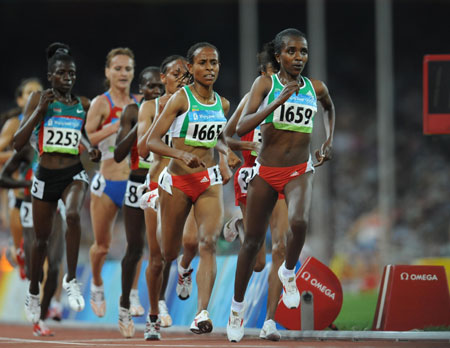 (The Sydney Morning Herald) — Kenenisa Bekele and Haile Gebrselassie may not yet have quite settled the issue as to who is the current emperor of Ethiopian distance running; but the matter of who is the empress is settled.
(The Sydney Morning Herald) — Kenenisa Bekele and Haile Gebrselassie may not yet have quite settled the issue as to who is the current emperor of Ethiopian distance running; but the matter of who is the empress is settled.
All hail empress Tirunesh Dibaba. Last night she kept her cool in a race that was as up-and-down as a 5pm office elevator, before sprinting away to complete an historic Olympic 5000/10,000 metres double, the first-ever women’s distance double.
Elvan Abeylegesse of Turkey was again second with Dibaba’s great rival and teammate, Meseret Defar third. The pair shared a victory lap under the Ethiopian flag. Despite the heat and humidity, it seemed to be quite cool in there.
The pair have been great, and reportedly, not friendly rivals.
At the world championships in Osaka last year, Dibaba won the 10,000, Defar the 5000. This year, Dibaba broke Defar’s world record by five seconds in Oslo, running 14:11.15. Defar had a real crack at getting it back six weeks later in Stockholm, running a personal best of 14:12.88 but falling just short. The stage was set for a match race in Beijing.
Dibaba and Defar have tracked each other throughout their careers, the pendulum swinging either way. Defar, two years older, was a world junior champion in 2002, the same year as one Usain Bolt.
Dibaba, 23, came through to win the 5000 at the following year’s world championships in Paris. Defar was run out in the heats, a rare failure in her career.
The Athens Olympic year saw Defar bounce back to win the 5000 in Athens, relegating Dibaba to the bronze medal. Afterwards, Dibaba suggested she had been taken by surprise, otherwise would surely have won.
In 2005, Dibaba added the 10,000 to her repertoire. After running a race in Sweden to qualify, she swept all before her in Helsinki.
It was cold, wet, windy and rainy, but she defied all that to win the distance double majestically, evoking inevitable comparisons with her male counterpart, Kenenisa Bekele. Defar finished second in the 5000.
The World Athletic Final was the stage for two titanic battles on one weekend in 2006. Defar beat Dibaba narrowly in the 3000 metres, Dibaba beat Defar even more narrowly _ one-hurdedth of a second _ in the 5000.
It took until the final kilometre to break an odd-kilometre slow, even-kilometre fast pattern. Predictably, it was Elvan Abeylegesse, the Ethiopian-born Turkish runner who set up such an epic race with Dibaba in the 10,000 on opening night, who did the work.
As the pace crept up in the fourth kilometre, Dibaba moved from the back of the pack to just off the lead. Defar, a feared kicker, stayed mid-group and almost paid the ultimate price when she stumbled and almost fell.
Fortunately, the kindness of others worked in her favour as the runner alongside her held her up. There was self-interest there, a fall in the pack would have inconvenienced several runners.
At 4000 metres, Dibaba moved to Abeylegesse’s shoulder. After another 100 metres, the Turk started to inject some real pace at last. The third last lap took 66.73 seconds — one of the opening laps had been closer to 90!
Dibaba responded immediately, as did Defar, at last getting on her main rivals heels. The end game was on. Abeylegessed only had one card and had played it. She sped through the second last lap in 64.42, but at the end of it, approaching the bell, Dibaba laid her cards down.
She was going, and if Defar wanted to win she had better shadow her. She could not. Instead the threat was coming now from Abeylegesse. Dibaba had two metres going down the back, a little more at 200.
She paid close attention to the big screen as she entered the straight 10 metres clear, but there was no response from Abeylegesse, no last sprint from Defar.
It was over in 15:41.40. Three times a world champion, once an Olympic bronze medallist, Dibaba had clinched her second Olympic gold medal a week after she won her first.